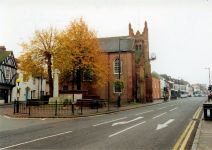Billericay (/bɪləˈrɪkiː/ (listen) BIL-ə-RIK-ee) is a town and civil parish in the Borough of Basildon, Essex, England. It lies within the London Basin and constitutes a commuter town 25 miles (40 kilometres) east of Central London. The town has two secondary schools and a variety of open spaces. It is thought to have been occupied since the Bronze Age.
History
Some of the earliest records of human occupation of Billericay are the burial mounds in Norsey Wood, showing evidence of occupation in the Bronze and Iron Ages. Evidence of Roman occupation has been found at a number of locations in the town and there may have been a small cavalry fort at Blunts Wall.
The Saxons did not settle in the centre of Billericay. They established themselves two miles (three kilometres) south, at Great Burstead. In the late 10th century, it was known as "Burhstede". Billericay was not mentioned in the Domesday Book, as it lay within Great Burstead. At this time, the parish church for Billericay was at Great Burstead.
Middle Ages
In the 13th and 14th centuries, some pilgrims to Canterbury journeyed via Billericay. Some of them may have spent the night in Billericay before crossing the River Thames at Tilbury. This may account for the large number of inns in the town.
Billericay's most notable historical episode was the Battle of Billericay during the Peasants' Revolt of 1381.
The Wycliffe preachers influenced the town. Four local people (Thomas Watts, Joan Hornes, Elizabeth Thackwell and Margaret Ellis) were burnt at the stake. Two other residents (Joan Potter and James Harris) were tortured for their faith during the reign of Queen Mary.
Pilgrim Fathers
A meeting of the Pilgrim Fathers, prior to their sailing in the Mayflower, is said to have taken place in Billericay high street; many local names and much historical imagery reflect this, such as Mayflower House, Mayflower Morris Men, Mayflower Taxis, Mayflower School and Mayf
